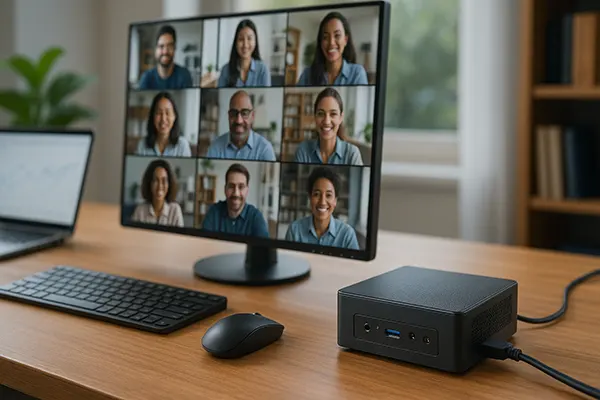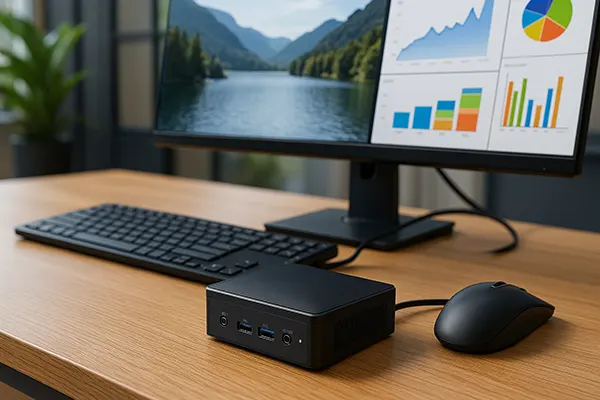
Energy-Efficient Mini-PCs for Remote Work and Virtual Workspaces
Energy-efficient mini-PCs have become an essential solution for professionals who need powerful yet compact systems to handle remote work and virtual collaboration in 2025. With modern processors, optimised energy consumption, and compatibility with virtual desktops, these devices combine practicality with sustainability, making them a smart choice for both businesses and individuals.
Key Advantages of Energy-Efficient Mini-PCs
One of the main strengths of mini-PCs lies in their reduced energy consumption compared to traditional desktop computers. Many models use processors built on advanced 5nm and 7nm technologies, which deliver strong performance while keeping power usage remarkably low.
Compact form factors also mean that these devices generate less heat, reducing the need for heavy cooling systems. This not only saves energy but also lowers noise levels, making them suitable for home offices and shared workspaces.
Furthermore, modern mini-PCs support multiple monitors and provide a full range of connectivity, ensuring that professionals can seamlessly manage complex tasks without relying on larger, less efficient systems.
Real-World Benefits for Professionals
For remote workers, energy-efficient mini-PCs help reduce electricity bills while maintaining reliable performance throughout the workday. This is particularly important for those who spend extended hours connected to cloud services, video conferencing, or virtual desktop infrastructure (VDI).
Businesses adopting these systems can cut overall operational costs by reducing energy consumption across their workforce. Many organisations are also aligning with environmental goals, and switching to mini-PCs contributes directly to lower carbon emissions.
Another significant benefit is portability. Compact size allows employees to carry their systems easily between offices or set them up quickly in hybrid working environments, without sacrificing productivity or stability.
Mini-PCs and Virtual Workspaces
Virtual workspaces have gained immense popularity in recent years, especially with the growth of remote-first companies. Mini-PCs are particularly well-suited for this purpose due to their compatibility with VDI and cloud-based platforms.
By relying on centralised computing resources, employees can run demanding applications securely while using energy-efficient hardware on their desks. This ensures that even resource-heavy tasks can be performed without requiring a high-powered traditional desktop.
Additionally, virtual workspaces improve security and compliance. Mini-PCs used as access points can operate with minimal local storage, reducing risks associated with data breaches and unauthorised access.
Current Models Supporting VDI
In 2025, leading manufacturers such as Intel NUC, ASUS PN series, and Lenovo ThinkCentre Tiny have introduced models specifically optimised for remote and virtual work. These systems include enterprise-grade processors, efficient cooling, and hardware-based security features.
Some mini-PCs come preconfigured with support for VMware Horizon, Microsoft Azure Virtual Desktop, and Citrix solutions. This ensures smooth deployment for IT departments managing large-scale remote teams.
Users can expect stable performance for everyday tasks such as video conferencing, file sharing, and multitasking, all while consuming significantly less power than older desktop machines.

Future of Remote Work with Energy-Efficient Mini-PCs
The trend towards sustainable technology in business is expected to continue, and mini-PCs will play a major role in shaping the remote work ecosystem. Their balance of performance, efficiency, and compactness makes them increasingly popular among professionals worldwide.
As companies look to optimise costs and reduce their environmental impact, the adoption of energy-efficient mini-PCs is likely to grow even further. Cloud and AI integration will also enhance the potential of these devices, creating smarter and more adaptive remote work setups.
For individuals, this shift means access to reliable, affordable, and eco-friendly computing solutions that can handle both professional and personal digital demands with ease.
Predictions for the Coming Years
Experts predict that by 2030, mini-PCs could replace up to 40% of traditional desktops in corporate environments. This transition will be driven by advances in processor efficiency, integration with AI-driven platforms, and growing awareness of sustainability goals.
Future mini-PCs are also expected to feature modular components, allowing users to upgrade storage and memory without replacing the entire unit. This will extend device lifespans and further reduce electronic waste.
Overall, energy-efficient mini-PCs represent not only a technological trend but also a cultural shift towards more responsible and practical computing for the remote-first era.



